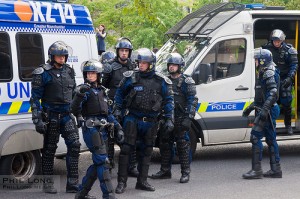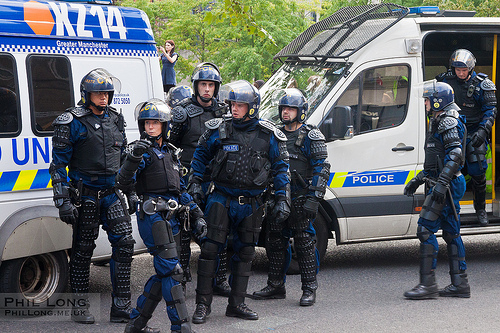 The recent riots in Britain have forced policy makers to look anew at a juvenile justice system that has historically focused on rehabilitation and diversion.
The recent riots in Britain have forced policy makers to look anew at a juvenile justice system that has historically focused on rehabilitation and diversion.
An AP story details growing public outrage and frustration of officials within the system to what they see as a soft approach to juvenile crime.
The change in tone has been set by Prime Minister David Cameron, who as recently as 2006 was celebrating programs aimed at understating marginalized youth, including one dubbed “Hug a Hoodie.”
Today, however, after major riots in London, Birmingham and Manchester and other U.K cities, the prime minister threatens not only jail but a loss of government support, including housing subsidies for young people participating in the disturbances.
Thousands have been arrested during and after the riots with about half of them, police say, under the age of 18.

The aftermath of recent ‘youth unrest’ in England’s major cities only serves to point at the depth of depravity and delinquency many youths have been exposed to. While it is agreeable by many that looting and other criminal acts during the crisis are opportunistic, the fact remains that the socio-economic trauma will linger for years to come, despite any form of financial recovery that can be offered to businesses and household affected by the carnage.
A journalist from Sky News (Parmenter?) was questioned as to why he granted TV air time to 4 youths who admitted their participation during the riot: his response was ‘to give the youths what they lacked – a Voice’.
It should be borne in mind that the UK is a diverse, multi-cultural, democratic society where non-demonstrability of democracy will naturally derive outcry from all quarters, irrespective of class, social status, race or geo-demographic characteristics.
Emerging governmental policies have resulted in uncertainty and insecurity for many in the populace. It is therefore plausible for people to feel ‘threatened’, ‘targetted’ and largely ‘disenfranchised’, as things continue to develop. A grave reminder of the 1980s. One wonders if the ongoing processing and penalty of arrested rioters will yield some fruitful lessons to ‘change’ the perception of these youths/adults because it is more of designed as ‘punitive’ rather than ‘reformative’. A ‘boot-camp -type’ of commune would have been more effective while an appropriate restorative justive approach could be used, especially within individual rioters’ communities.
It is obvious that the unfortunate death at Tottenham was used as a springboard for the all-out riot, it is in no way connected to the rationale for looting and destruction of businesses – which is why the riot were tagged ‘opportunistic, mindless and destructive’, especially when it happens within respective communities.
Nevertheless, it is necessary to look at the situation from a youth perspective. For some years now, there has been significant spate of criminality among youths – of all colours/races. This has not been curbed in any effective way to deter its continuity. My read-up in the past year identified a ‘killing’ – stabbing or by gun – almost as a weekly occurrence. This is an indicator of ‘youth restiveness’ and a drift to delinquency and criminality. The question one may ask is ‘what resolve has been offered beyond investigation and or, apprehension of such offender.
Productive youth programmes have been decimated significantly, leaving those with little or no drive for constructive achievement to seek whatever activities that offer them some recognition or bravado – a very dangerous situation.
While inept,arbitrary policing have been blamed by some from the general public, it will be quite damning to expect the police to function wholeheartedly and demonstrate ‘excellent’ professionalism when the ‘sword of damocles’ hang over many heads. Morale is low in the police system and no assurance can rejuvenate how the majority of the police workforce feel at the moment. Additionally, the students’ demonstrations has placed a dent on enthusiasm and drive to pursue law enforcement to its optimum. It has become a reality that after 2012, a certain percentage of the police rank and file would lose their job. Who then would want to engage fully in life-threatening policing?
Historically, there has always been a distinctive disparity between the white and black youths, to an extent this disparity retains as a ‘code of practice’ for all institutions, from school to the police, to various public services where discriminatory practices go unchecked. Trans-cultural/racial dynamic seem not to abate the feel of ‘negative differential’ with psychological import of racial complex and ‘hopelessness’.
There were those days when no amount of educational achievement could be a determinant of acceptance into the English elite class. The legal professional from a non-white origin would need to prove ‘beyond any reasonable doubt’ three times over and beyond his white counterpart to be acceptable in the law courts – fluency, eloquence and knowledge of the law has to be proven systematically as opposed to a white lawyer who would walk into the court with an attitude, and yet would feel his colleague from the opposite side can be nothing but ‘an underdog’.
The locations targetted by the rioters, as could be summarised, were localities where they were frequently in touch with. While many might have targetted these locations for financial gains, some others confessed to effecting damages because ‘they had sought employment and not offered’ by these businesses – form of revenge or, reprisal. But how many employees can a local business take on?
A social enterprise structure to involve youths and a mentoring scheme, where present and futuristic projects can be mapped out will work towards easing the stress, tension and negative disturbance continually experienced by the restless youths.
Lastly, parental responsibility has been at a very low ebb, if not, has dimished drastically for many years. Government policies on parenting has been seen by many, particularly the BMEs as an intrusion into family life. Many new migrants feel that the rights of the child has been overprescribed and ill-thought through by the state, to an extent that parents are no longer able to safely reprimand their children for fear of socio-legal repercussions
Yes, there is already moral decay and such ideologies as ‘hug a hoodie’ is alien to the UK. Fashio is acceptable and conventional but the fact that fashion is used to disguise against apprehension for commission of crime makes the effort baseless and collusive – tantamount to speculated ‘divide and rule’ society.